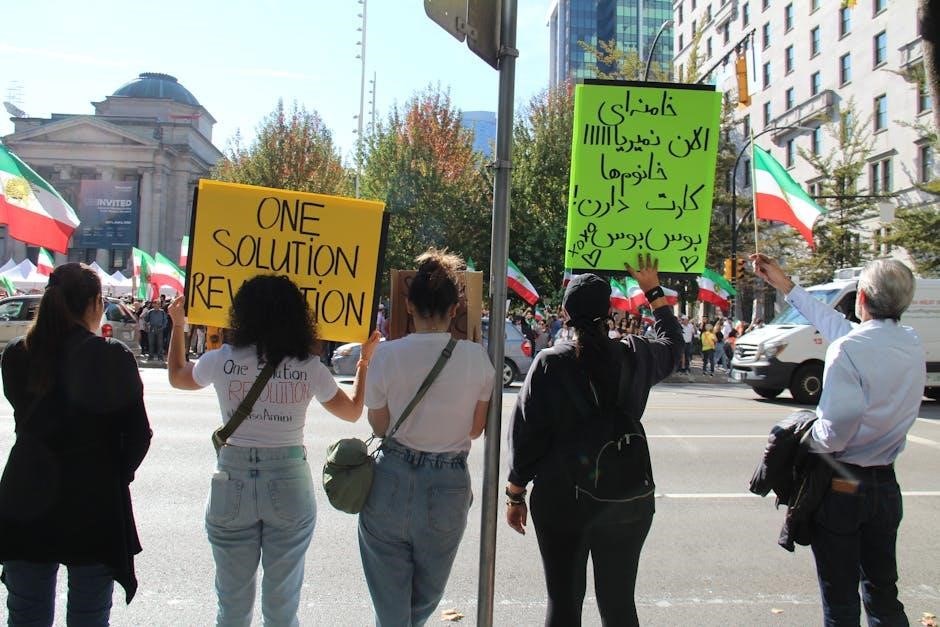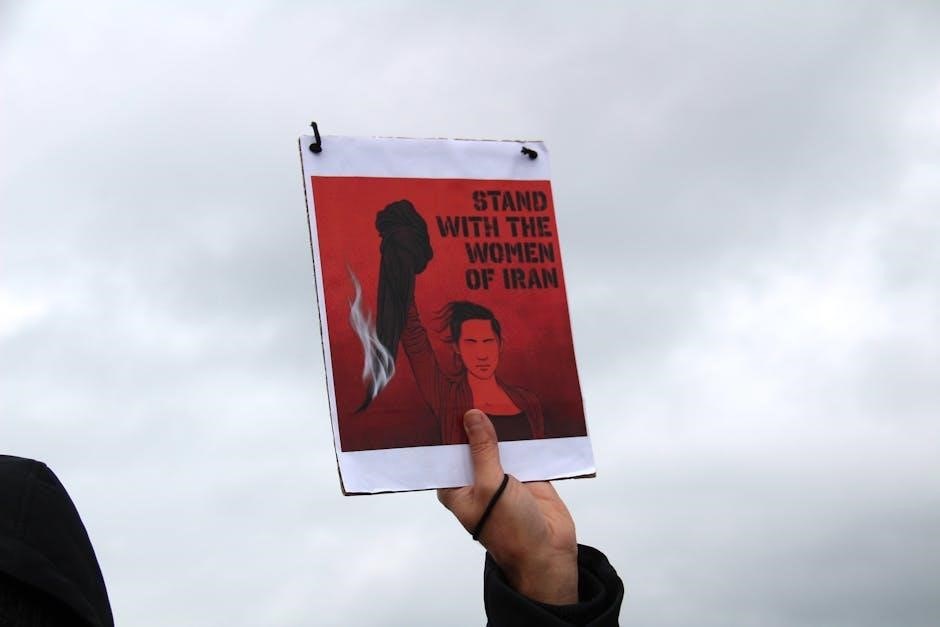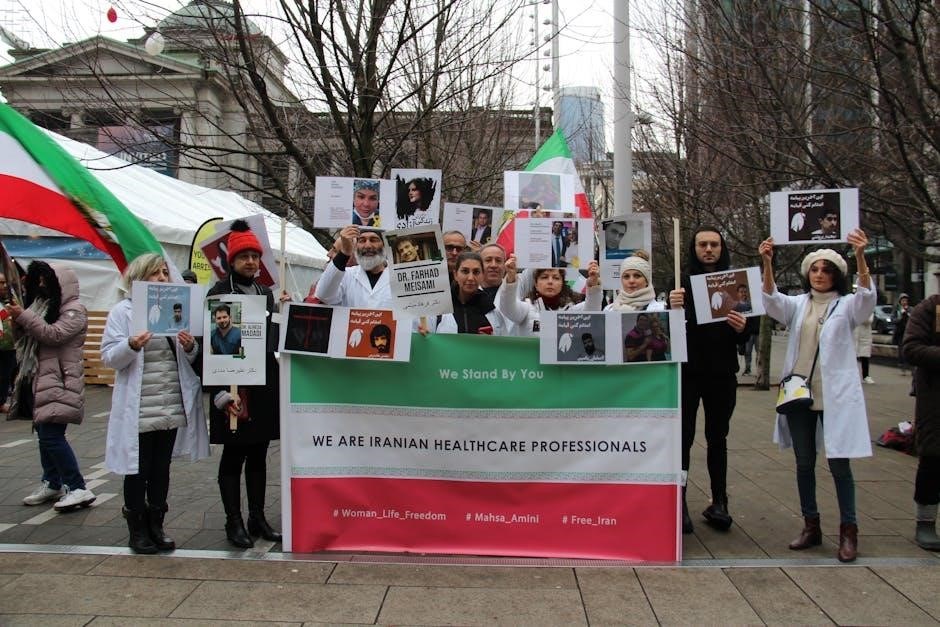Overview of the Book and Its Authors
The First Global Revolution‚ written by Alexander King and Bertrand Schneider‚ explores global challenges‚ interconnectedness‚ and the need for sustainable development‚ published by Pantheon Books in 1991.
The First Global Revolution‚ authored by Alexander King and Bertrand Schneider‚ is a seminal work published in 1991 by Pantheon Books. As key figures in the Club of Rome‚ an influential think tank focused on global governance‚ King and Schneider provide a comprehensive analysis of the interconnected challenges facing humanity. The book serves as a report by the Club of Rome‚ addressing critical issues such as population explosion‚ climate change‚ food security‚ and geopolitical shifts. It emphasizes the urgent need for a shift from a military to a civil economy and highlights the precarious nature of global stability. By examining these interconnected problems‚ the authors aim to inspire collective action and sustainable development. This work remains a foundational text for understanding the complexities of the modern world and the imperative for global cooperation.
The Club of Rome and Its Role in Global Governance
The Club of Rome‚ a prestigious global think tank‚ plays a pivotal role in addressing pressing planetary challenges. Founded in 1968‚ it brings together intellectuals‚ policymakers‚ and business leaders to analyze complex issues. The Club’s objective is to foster understanding of interconnected global problems and advocate for sustainable solutions. Through publications like The First Global Revolution‚ the Club emphasizes the need for collective action to address crises such as population explosion‚ climate change‚ and resource depletion. Its work underscores the importance of global governance and interdependence‚ urging nations to move beyond fragmented approaches and adopt cooperative strategies for a sustainable future.
By providing a platform for dialogue and research‚ the Club of Rome has become a key influencer in shaping global policy and awareness‚ inspiring transformative change on a planetary scale.
The Historical Context of the First Global Revolution
The First Global Revolution is deeply rooted in the tumultuous events of the late 20th century‚ particularly the period following World War II. The post-war era saw unprecedented economic growth in industrialized nations‚ but this prosperity was overshadowed by the Cold War‚ environmental degradation‚ and social unrest. By the 1960s and 1970s‚ global challenges such as population explosion‚ resource depletion‚ and climate change began to emerge as critical issues. The book highlights the 1968 “Great Divide” as a pivotal moment‚ marking the end of rapid economic growth and the rise of widespread protests and cultural shifts. Against this backdrop‚ the Club of Rome’s report underscores the interconnectedness of these crises‚ arguing that they demanded a unified global response to prevent catastrophic outcomes. This historical context sets the stage for the revolution’s call for a shift from military to civil priorities and sustainable development.

Key Themes and Concepts
The book addresses critical global challenges‚ including the shift from military to civil economies‚ population explosion‚ climate change‚ and food security‚ emphasizing the need for sustainable development and cooperation.
The Shift from a Military to a Civil Economy

The First Global Revolution emphasizes the urgent need to transition from a military-driven economy to a civil-oriented one. This shift is critical for addressing global challenges like poverty‚ inequality‚ and environmental degradation. By reallocating resources from military spending to education‚ healthcare‚ and sustainable infrastructure‚ societies can foster long-term stability and prosperity. The authors argue that this transition is not only economically viable but morally imperative‚ as continued prioritization of military interests exacerbates global instability. The book highlights successful examples where such shifts have led to significant improvements in quality of life and reduced conflict. This theme underscores the importance of redefining priorities to achieve a more equitable and peaceful world.
The Impact of Population Explosion on Global Stability
The rapid growth of the global population has emerged as a critical threat to worldwide stability‚ exacerbating resource scarcity and social tensions. The book highlights how population explosions‚ particularly in developing regions like India‚ Egypt‚ and the Caribbean‚ strain agricultural systems‚ water supplies‚ and energy resources. This strain often leads to food insecurity‚ mass migrations‚ and political instability. The authors emphasize that unchecked population growth intensifies competition for finite resources‚ fostering conflict and undermining global cooperation. Additionally‚ the environmental impact of a burgeoning population accelerates climate change‚ further destabilizing ecosystems and economies. Addressing population growth is thus essential for achieving sustainable development and ensuring a stable future. The text underscores the need for comprehensive policies to balance demographic trends with resource availability and environmental sustainability.
Climate Change and Its Role in the Global Revolution
Climate change is a pivotal driver of the global revolution‚ as highlighted in the book. The authors underscore how shifting climate patterns disrupt ecosystems‚ threaten food security‚ and destabilize economies. Rising temperatures and extreme weather events exacerbate resource scarcity‚ leading to social unrest and mass migrations. The interconnectedness of climate issues with population growth and energy consumption creates a complex web of challenges. The book warns that without immediate collective action‚ climate change could precipitate a global crisis‚ undermining the foundation of modern societies. It calls for a paradigm shift towards sustainable practices and international cooperation to mitigate these risks and ensure a resilient future. Addressing climate change is not just an environmental imperative but a cornerstone of the global revolution. The text emphasizes the urgency of this challenge and the need for innovative solutions.
Food Security and the Precautions of Global Food Systems
The First Global Revolution emphasizes the precarious nature of global food security‚ highlighting how population growth‚ geopolitical shifts‚ and environmental degradation strain food systems. The book warns that the increasing demand for resources‚ coupled with climate instability‚ threatens food availability and distribution. It underscores the vulnerability of global food systems to disruptions‚ such as trade conflicts or natural disasters‚ which could exacerbate hunger and social instability. The authors advocate for sustainable agricultural practices and international cooperation to address these challenges. They also stress the need for precautionary measures to ensure equitable access to food‚ particularly in regions most at risk. The interdependence of food security with other global issues‚ such as energy and climate change‚ is a recurring theme. Addressing these challenges requires a holistic approach to prevent food crises from escalating into broader societal upheaval. The book calls for urgent action to safeguard global food systems.

The Problematique of the Modern World
The modern world faces a complex interplay of energy crises‚ population explosion‚ and climate change‚ all exacerbating global instability and overwhelming governance capabilities.

Energy Crisis and the Arms Race
The energy crisis and arms race are central to the modern world’s challenges‚ as highlighted in The First Global Revolution. The book underscores how energy shortages and the escalating arms race strain global resources‚ fostering instability and competition among nations.
The authors emphasize that the arms race diverts critical resources from sustainable development to military buildup‚ exacerbating economic disparities and geopolitical tensions. This cycle perpetuates a vicious loop‚ making global cooperation increasingly difficult.
Moreover‚ the energy crisis intersects with climate change‚ as reliance on fossil fuels accelerates environmental degradation. The book warns that without addressing these dual challenges‚ the world faces a catastrophic convergence of resource scarcity and conflict.
Cultural Identity and Globalization
Cultural identity and globalization are pivotal themes in The First Global Revolution‚ as the book explores how global integration impacts local cultures and traditions. The authors highlight the tension between the preservation of cultural heritage and the homogenizing effects of globalization.
Globalization‚ driven by commerce‚ migration‚ and the spread of ideas‚ has reshaped cultural landscapes‚ often leading to the erosion of unique identities. The book illustrates this through examples from regions like India‚ Egypt‚ Guiana‚ and the Caribbean‚ where global influences have intertwined with local traditions.
However‚ this cultural blending has also sparked resistance‚ as communities strive to maintain their distinctiveness. The authors warn that ignoring these cultural dynamics could exacerbate social unrest‚ underscoring the need for a balanced approach to globalization.
Ultimately‚ the book calls for a global society that respects cultural diversity while fostering unity‚ emphasizing that cultural identity is a cornerstone of human dignity and stability in a rapidly changing world.
The Interconnectedness of Global Challenges
The First Global Revolution emphasizes the interconnectedness of global challenges‚ illustrating how issues like population growth‚ climate change‚ and energy crises are deeply interlinked.
The authors argue that these challenges cannot be addressed in isolation‚ as their effects ripple across borders and sectors. For instance‚ climate change exacerbates food insecurity‚ while energy shortages can destabilize economies and geopolitical relations.
This interconnectedness highlights the complexity of modern problems‚ where solutions require coordinated global efforts. The book underscores how neglecting one challenge can amplify others‚ creating a cascade of crises.
By exploring these linkages‚ the report calls for holistic strategies that consider the broader implications of each issue‚ emphasizing the need for collective action to navigate the intricate web of global challenges effectively.

The Great Transition and a New Global Society
The First Global Revolution highlights the transition towards a sustainable‚ interconnected society driven by advanced technologies and geopolitical shifts‚ fostering a new global order for future stability.
The Role of Advanced Technologies in Shaping the Future
The First Global Revolution emphasizes the transformative potential of advanced technologies in driving societal change. These innovations‚ including renewable energy‚ AI‚ and digital networks‚ are seen as pivotal in addressing global challenges like climate change and resource depletion. The book highlights how these technologies can foster a shift toward a more interconnected and sustainable world‚ enabling new economic models and governance structures. By leveraging technological advancements‚ the authors envision a future where humanity can overcome current crises and build a resilient‚ equitable global society; This perspective underscores the importance of integrating technology with systemic change to achieve long-term stability and prosperity.
Geopolitical Shifts and Their Implications
The First Global Revolution discusses significant geopolitical shifts that have reshaped global power dynamics. These changes‚ including the rise of new economic powers and the decline of traditional dominance‚ create both opportunities and challenges. The book highlights how such shifts impact global governance‚ resource distribution‚ and international relations. It emphasizes the need for adaptive strategies to manage these transitions‚ ensuring stability and cooperation in a rapidly evolving world. By examining these geopolitical changes‚ the authors provide insights into how they influence the path toward a sustainable and equitable global society‚ urging collective action to address emerging complexities.
Social Unrest and the Rise of Protests Worldwide
The First Global Revolution examines the surge in social unrest and global protests‚ linking them to widespread dissatisfaction with economic and political systems. The book highlights how issues like inequality‚ environmental degradation‚ and governance failures have fueled mass movements worldwide. It underscores the role of youth and marginalized communities in driving these protests‚ seeking systemic change. The authors argue that such unrest reflects deeper structural flaws in the global order‚ requiring transformative solutions to address root causes. By analyzing these trends‚ the book emphasizes the urgency of fostering inclusive policies and international cooperation to mitigate social tensions and build a more equitable future.

Case Studies and Examples
The book examines historical events and regional impacts‚ focusing on areas like India‚ Egypt‚ Guiana‚ and the Caribbean‚ to illustrate the interconnectedness of global challenges and revolutionary changes.
Historical Events Leading to the Global Revolution
The First Global Revolution highlights pivotal historical events that shaped the world’s trajectory‚ such as the Great Divide of 1968‚ marking the end of rapid economic growth in industrialized nations and the rise of social unrest. This period saw widespread protests and cultural movements‚ reflecting a growing dissatisfaction with existing systems. The authors emphasize how these events‚ coupled with population explosions‚ climate change‚ and geopolitical shifts‚ created a perfect storm of challenges. The Club of Rome’s report underscores the interconnectedness of these issues‚ arguing that they collectively precipitated the need for a global revolution. By examining these historical milestones‚ the book provides a framework for understanding the roots of modern global instability and the urgency for transformative change. This historical context is crucial for grasping the complexity of the challenges addressed in the report.
Regional Impacts: India‚ Egypt‚ Guiana‚ and the Caribbean
The First Global Revolution examines the diverse regional impacts of global challenges in India‚ Egypt‚ Guiana‚ and the Caribbean. These regions faced unique struggles‚ including population growth‚ resource scarcity‚ and political instability. India’s rapid population expansion and economic shifts are highlighted‚ while Egypt’s challenges with food security and water scarcity are explored. Guiana and the Caribbean‚ with their rich natural resources‚ faced issues of exploitation and underdevelopment. The book emphasizes how these regions’ histories of colonialism and globalization contributed to their vulnerabilities. By studying these case studies‚ the Club of Rome illustrates the interconnectedness of global and local challenges‚ advocating for tailored solutions to address regional disparities. This focus on specific regions underscores the need for a coordinated global response to ensure sustainable development and equity.
The Great Divide of 1968 and Its Legacy
The Great Divide of 1968 marked a pivotal moment in global history‚ symbolizing the end of a long period of rapid economic growth and the beginning of a new era of uncertainty. This year was characterized by widespread social unrest‚ with uprisings in numerous countries‚ reflecting deep cultural and political tensions. The Club of Rome’s report highlights 1968 as a turning point‚ where the world transitioned from an era of post-war prosperity to one of heightened global challenges. The legacy of 1968 lies in its exposure of systemic vulnerabilities‚ including economic disparities‚ environmental concerns‚ and geopolitical instability. It underscored the need for collective action to address interconnected global issues‚ setting the stage for the themes explored in The First Global Revolution. This period remains a critical reference point for understanding the complexities of modern global dynamics.

Strategies for Sustainable Development
The book emphasizes reducing inequality‚ investing in renewable energy‚ and fostering global cooperation to address interconnected challenges‚ promoting a sustainable future through collective action and innovation.
Development Strategies for a Changing World
The book highlights the need for adaptive governance and sustainable development strategies to address global challenges. It advocates for reducing inequality‚ investing in renewable energy‚ and fostering global cooperation. Advanced technologies‚ such as AI and biotechnology‚ are seen as key drivers for solving complex issues like climate change and food security. The authors emphasize the importance of shifting from a military to a civil economy‚ prioritizing human well-being over geopolitical dominance. They also stress the need for collective action to manage population growth and ensure food security. By promoting interdependence and innovation‚ the strategies aim to create a resilient and equitable global society capable of navigating the uncertainties of the 21st century. These approaches are designed to mitigate risks and harness opportunities for a sustainable future.
Civilization Crises and the Need for Collective Action

The First Global Revolution underscores the urgency of addressing civilization crises through collective action. It highlights how global challenges like climate change‚ energy shortages‚ and food insecurity are deeply interconnected‚ requiring a unified response. The book emphasizes that no single nation or sector can solve these problems alone‚ stressing the need for international cooperation and shared responsibility. By advocating for a shift in priorities‚ the authors call for a transformation in global governance to tackle these crises effectively. Individual and collective efforts are essential to mitigate risks and ensure a sustainable future. The report serves as a rallying call for global unity‚ urging societies to move beyond fragmented approaches and work collaboratively to address the complexities of the modern world.

Interdependence and Cooperation in the Global Community
The First Global Revolution emphasizes the interconnectedness of global challenges‚ highlighting the necessity for cooperation within the international community. It underscores that no nation can isolate itself from issues like climate change‚ population growth‚ or energy crises‚ as these transcend borders. The book calls for a paradigm shift‚ urging nations to move beyond self-interest and embrace collective responsibility. By fostering cooperation‚ the global community can address these challenges more effectively‚ ensuring shared solutions and a more equitable distribution of resources. The report advocates for strengthened international institutions and agreements to facilitate collaboration‚ ultimately promoting a stable and sustainable world order. Interdependence‚ it argues‚ is not a vulnerability but a foundation for resilience and progress in the face of global crises.
The Club of Rome envisions a sustainable future‚ urging collective action to address global challenges. Individuals play a crucial role in shaping this transformative global revolution.
The Vision of the Club of Rome for a Sustainable Future
The Club of Rome envisions a sustainable future where global challenges are addressed through collective action and innovation. In The First Global Revolution‚ the authors emphasize the need for a shift from military to civil economies‚ addressing population growth‚ climate change‚ and food security. They advocate for reducing inequality and ensuring sustainable resource use. Advanced technologies are seen as key drivers of this transformation‚ enabling new geopolitical alignments and fostering global cooperation. The vision underscores the importance of cultural identity amidst globalization and highlights the interconnectedness of global challenges. By prioritizing sustainable development‚ the Club of Rome aims to create a resilient world where individuals‚ governments‚ and organizations work together to address civilization crises and build a harmonious future.
Challenges and Opportunities in the 21st Century
The 21st century presents significant challenges‚ including climate change‚ energy crises‚ and social unrest‚ as highlighted in The First Global Revolution. Rapid population growth and resource depletion threaten global stability‚ while technological advancements offer opportunities for sustainable solutions. The book emphasizes the need for collective action to address these interconnected issues. Advanced technologies‚ such as renewable energy and smart systems‚ are seen as key enablers of a sustainable future. However‚ geopolitical shifts and cultural identity concerns must also be navigated. The vision of the Club of Rome underscores the potential for innovation to drive positive change‚ but it requires global cooperation and a commitment to equity. By leveraging these opportunities‚ humanity can overcome current challenges and build a resilient‚ interconnected world for future generations.
The Role of Individuals in Shaping the Global Revolution
Individuals play a pivotal role in driving the global revolution‚ as emphasized in The First Global Revolution. The book highlights that change begins with personal agency‚ education‚ and advocacy. By fostering awareness of global challenges such as climate change‚ resource depletion‚ and inequality‚ individuals can inspire collective action. The authors encourage people to embrace their role as explorers and risk-takers‚ pushing boundaries to create a sustainable future. Through grassroots initiatives‚ technological innovation‚ and cultural shifts‚ individuals can influence policymakers and communities. The vision of the Club of Rome underscores that every person has the power to contribute to systemic change‚ making the global revolution a shared responsibility. By aligning personal actions with global goals‚ individuals can help shape a more equitable and resilient world.
